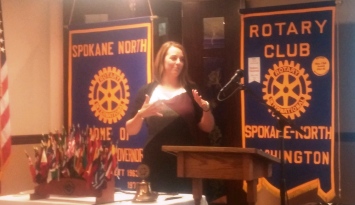American Red Cross - Megan Snow
Posted by Charles Rehberg
on Feb 08, 2016
Spokane North Notes
A weekly bulletin of the Spokane-North Rotary
February 8, 2016
Editors: Chuck Rehberg and Sandy Fink
Photo: Eric Johnson
Program coordinator: Brad Stark
No meeting: With Presidents’ Day -- a federal holiday -- the club will not meet on Monday Feb. 15. (It’s too hard to compete with all those mattress and furniture sales.) See you Feb. 22.
Team players: Club membership was divided into four teams to discuss fund-raising strategies for the Holmes Elementary projects and other programs to help needy children. Teams will meet every other Monday to discuss corporate gifts and auction items procurement. Project coordinators are Jodi Harland and Robbie Jackson.
Details: The fund-raising goal this year is $25,000. The main fund-raising event is a Mexican fiesta party June 2 at The Backyard on West Broadway. Featured auction item will be a spring break trip to Mexico in 2017. President Lenore Romney said, “This is it. This is our big chance. Without the fund-raising effort, we can’t do these things for Holmes.”
Red Cross programs help before and after disasters
Every day is a “dolphin day” for Megan Snow.
 Snow, executive director of the Inland Northwest Chapter of the American Red Cross, described her agency’s disaster-relief programs for the club Feb. 8.
Snow, executive director of the Inland Northwest Chapter of the American Red Cross, described her agency’s disaster-relief programs for the club Feb. 8. Snow said she keeps a small red plastic dolphin on her desk as a reminder about how Red Cross relief programs help people -- in this case a small child forced to evacuate with her family from a house fire. Snow gave the girl a “comfort kit” with toiletries and a coloring book. The girl who “was very much into dolphins,” gave Snow one of her prized collections in return.
The year 2015 was “a disaster-based year,” Snow said. Springtime fires near Wenatchee were followed by massive summer wild fires in northeast Washington and early winter brought the devastating wind storm to Spokane.
The larger-scale disasters stole headlines from the everyday house fires and other calamities which force families to seek Red Cross shelters and other help.
Even her agency’s office at 315 W. Nora suffered a windstorm-caused power outage – and the office did not have its own generator, Snow said. She is a GU grad who has been with the Red Cross seven years.
The Inland Northwest office covers 10 Washington counties and five Idaho counties. Snow said that expanse is one of the largest coverage areas in the country. The agency has a satellite office in Wenatchee and operates with 10 staff members and 700 volunteers.
Because of the 24/7, 365-day coverage, Snow said, many of the volunteers carry pagers. She said she has to tell younger audiences “what a pager is.”
Snow said the Red Cross was founded in 1881 and the Spokane office in 1914. The Red Cross is not a federal agency, she stresses, but it does have a Congressional charter, supporting the purposes of its 260 chapters.
She said Red Cross services, in addition to disaster relief, include biomedical programs (coordinating 40 percent of blood donations nationally, but not in Spokane), preparedness health and safety programs, international programs (global networks, including measles vaccinations) and service to the Armed Forces (including reconnecting families).
Nationally each year, Snow said, Red Cross teaches lifesaving and CPR classes to 25,000 people and administers 424,000 doses of measles vaccine. Some 4,000 smoke detectors have been installed regionally to needy homeowners and renters, including 750 in the area, she said.
One special Inland Northwest program, she said, is the “flat mommies/flat daddies” outreach. Life-size photos of family members deployed for military service are glued to foam boards to help infants and toddlers visualize an absent parent. Snow said the foam boards, done in various sizes, are placed in children’s bedrooms and at the dinner table to keep current the visual images.
A special emergency-preparedness program is the “pillow case project.” Snow said participants are taught to grab a pillow case, toss in a few valued or treasured items (done with pre-planning) and quickly exit a burning house, hopefully in less than two minutes. Some 10,000 children in the Inland Northwest have been instructed in the program, answering the question “what would you take?” Snow said.
To facilitate emergency preparedness, she encourages audiences to download the free Red Cross emergency app.
Snow said her message to those suffering loss is: “We can’t make it whole, but we can make it better.”
